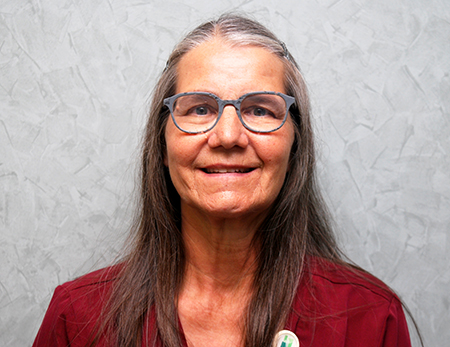Newborn not eating? We have an expert for that.
Family Health
Infant swallowing assessment just one service offered at the Telfair BirthPlace at St. Joseph’s/Candler
Newborn babies are masters of three things: eating, sleeping and pooping. But what if your baby is struggling when feeding?
At St. Joseph’s/Candler, we have an expert that works closely with our Neonatal Intensive Care Unit (NICU) babies that have difficulty sucking and swallowing. Kim Screen is a speech-language pathologist who is also trained to assess newborn babies’ feeding habits.
“When we are first consulted, we are usually asked to assess the feeding and swallowing portion of their development,” says Screen, who’s been a speech-language pathologist at Candler Hospital for 27 years. “With premature babies, they tend to have very poor stamina and very uncoordinated sucking patterns.”

Most babies born at 37 weeks or later have a mature sucking, swallowing and breathing pattern. They have no problem feeding from the breast or bottle. There are some babies born before 37 weeks that also take naturally to feeding.
However, certain babies have difficulty feeding. Some may have medical problems to overcome, such as an infection or respiratory issue, Screen says. Others may have a low birth weight that affects their stamina. There are no predictors as to whether or not your baby will have trouble feeding, Screen says.
But one thing is for sure: Screen and the dedicated team of neonatologists and NICU nurses will make sure your baby gets the nutrition he or she needs and eats properly.
“Babies do not leave the NICU until they’ve met all their feeding goals, as well as a few other things they’re required to accomplish,” Screen says. “Their goal is to oral feed safely and efficiently and take in the amount they are supposed to take for 48 hours and then they are about ready to be discharged.”
How do you get there?
When Screen first assesses a newborn, she’s looking for any choking or signs that they are not swallowing safely, which could indicate aspiration. She also looks for signs of shortness of breath or coughing during a feeding.
NICU babies are constantly monitored, so Screen also can watch their heart rate and saturation rate to see if they are struggling while eating.
“When they are struggling that’s when you stop and give them a rest break or stop altogether and finish up with tube feeding,” Screen says.
Tube feeding, known as nasal gastric tube feeding, allows babies to get breast milk or formula via a tube so they get the nutrition they need to grow and develop. The goal is to wean them off tube feeding to oral feeding.
Babies will stay on tube feedings until they show signs of alertness and desire to try oral feeding. These indicators can include bringing their fingers towards their mouth or sucking on their fingers.
Then, baby can try eating by combining breast or bottle with tube feeding until baby is fully orally feeding.
“Most babies that I work with have had some medical issues right when they are born, and they just need time to grow and mature and develop endurance so they can feed from the breast or bottle safely.”
In severe cases, some babies may experience aspiration, which occurs when something enters the airway or lungs by accident. When aspiration occurs in newborns, it’s typically due to trouble swallowing normally.
If they show signs of aspiration or continue to have difficulties feeding, a Modified Barium Swallow study may be performed. This test is performed in our radiology department and is a special procedure that looks at baby’s swallowing to see if anything is blocking the airway, preventing liquid from going down or if anything is entering the lungs. This test is normally performed when baby is at least 37 weeks.
Another thing Screen does is parental education. She helps parents understand what signs to look for that baby is ready to oral feed and signs to look for when baby needs a break from orally feeding. It’s another goal of hers, as well as the entire NICU team, to make parents feel as at ease as possible.
“It’s important to educate parents and provide them with strategies to help their baby work towards being exclusive oral feeders,” Screen says. “At the same time, we want to reassure them their baby is going to be fine.”